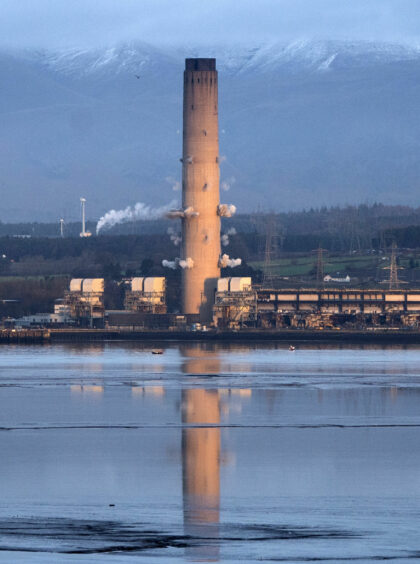
After decades of dominating the skyline around the Firth of Forth, the chimney at Scotland’s last remaining coal-fired power station has been toppled.
Nicola Sturgeon pushed the button that ignited 700kg of explosives and brought down the stack at Longannet in Fife, which has stood for more than 50 years, in what has been described as a “historic moment” by environmentalists.
ScottishPower closed the station in 2017, bringing an end to coal-fired power production.
The energy company now generates 100% green electricity through its wind and solar farms.
— ScottishPower (@ScottishPower) December 9, 2021
Ahead of the demolition, ScottishPower projected the slogan Make Coal History on to the chimney stack, and also the Global Warming Stripes which show the change in global temperature from 1850 to 2020.
Sturgeon said: “Today’s event is a symbolic reminder that we have ended coal-fired power generation in Scotland, as we work in a fair and just way towards becoming a net-zero nation by 2045.
“Our goal is to generate 50% of overall energy consumption from renewable sources by 2030, and Scotland’s energy sector is well placed to deliver on the key investments in renewables, hydrogen and energy storage required to achieve this.
“Growth in these sectors over the next decade will be transformative for Scotland, delivering further good, green jobs, strengthened energy security, and benefits for local communities as we decarbonise industry and society to mitigate the worst effects of climate change, in a way that leaves no-one behind.”
2/ For those who worked at Longannet over past 50 years, today will have brought mixed emotions. But we should take confidence that, with planning and investment, we can make the transition away from fossil fuels and to net zero without leaving people or communities behind pic.twitter.com/F31OWloYbh
— Nicola Sturgeon (@NicolaSturgeon) December 9, 2021
A moment in history
Longannet began generation in 1970 and ScottishPower said it was the largest coal-fired power station in Europe when first built, remaining the largest in Scotland until it closed on March 31, 2016.
At the height of operations, it burned coal from around the world including from as far away as Russia and Colombia, as well as from Scottish open-cast mines.
Typically, it consumed four million tonnes of coal per year and at full production could make enough electricity to power two million homes.
Keith Anderson, chief executive of ScottishPower, said: “At Cop26 in Glasgow, we were proud to show the world that Scotland has already made coal history.
“As a 100% energy company, we are committed to helping the UK end its reliance on fossil fuels.
“For half a century, Longannet’s chimney has dominated the Firth of Forth skyline. We bade farewell to that landmark today – however this is a landmark day for Scotland too.
“Watching the chimney of Scotland’s last coal-fired station fall today represents a real milestone, as the UK moves away from the large polluting power stations of the past and accelerates down the road to net-zero emissions.
“We already know the transition from fossil fuels to renewable energy is essential to minimise the worst impacts of global warming and address the climate emergency.”
The demolition of Longannet is being carried out by ScottishPower contractor Brown and Mason and work to remove materials at the site will continue into 2022.
Ignacio Galan, chairman of ScottishPower and Iberdrola, said: “Longannet played an important role in Scotland’s history as its largest coal station, but the future can only be about clean energy.
“Everyone working at ScottishPower and the wider Iberdrola Group should be proud to be contributing to this impressive transition from fossil fuels to renewables.”
Lang Banks, director of WWF Scotland, said: “It’s an historic moment to see the chimney of Scotland’s last coal-fired power station come down.
“We have successfully made coal power history in Scotland and rapid progress is now being made globally towards cleaner, renewable energy.”

Enjoy the convenience of having The Sunday Post delivered as a digital ePaper straight to your smartphone, tablet or computer.
Subscribe for only £5.49 a month and enjoy all the benefits of the printed paper as a digital replica.
Subscribe © PA
© PA